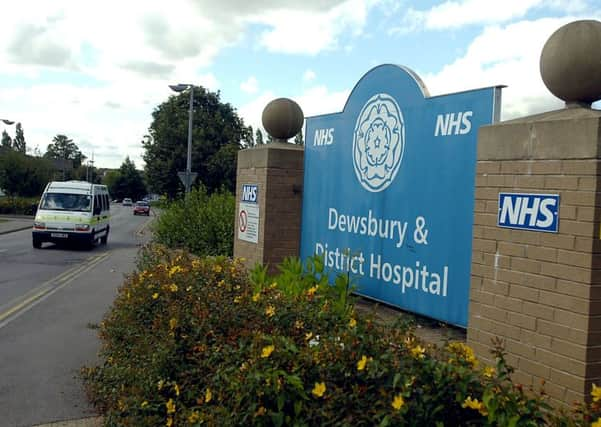Andrea Jenkyns: Horrors in our hospitals that must be stopped


This 20-minute procedure took over two hours as training doctors practised inserting the tube into my dad’s lungs. It took place in a room that was used to store cleaning supplies. Shortly after he came home from hospital we could tell something wasn’t right; the wound wasn’t healing and it was starting to smell.
Dad was readmitted to the hospital and diagnosed with MRSA. He died in November 2011.
Advertisement
Hide AdAdvertisement
Hide AdTo this day, there has been no satisfactory investigation, and no real answers about why dad died like this, emaciated in a hospital bed.
And we are not alone.
My constituent Joan Reid passed away on November 1, 2015, after being admitted to Dewsbury Hospital following a fall in August.
Her daughters watched their mother slip away from them as she struggled to eat and drink. They were continually told that she was medically fit for discharge, despite the obvious changes they could see in her.
Advertisement
Hide AdAdvertisement
Hide AdHer daughter Deborah visited her near the end and what she saw shocked her. Her mother was unable to open her eyes which were practically glued shut; her tongue had fallen back in her throat so she was unable to speak.
Calling out with her hands, it was clear to Deborah that her mother was unwell, and she and her sister were baffled by the assertions that she was medically fit. She heartbreakingly described her mother’s condition as like “something from a horror film”.
She was not receiving appropriate observation, and even when a doctor was called, none came.
A consultant has since admitted after an internal investigation that there were failings, but there is no way for Deborah or her sister to ensure that no family will have to go through the same experience.
Advertisement
Hide AdAdvertisement
Hide AdAcross the world, one million people die every year due to clinical mistakes. In England analysis says that 3.6 per cent of hospital deaths have a 50 per cent or more chance of being avoidable. That could mean 150 people dying each week, needlessly.
There are 650 of us in the House of Commons. Under these figures, we’d all be killed off in just over a month.
For too long incidents like this have fallen by the wayside without proper, transparent, impartial investigation.
But that is all about to change.
Health Secretary Jeremy Hunt puts patient safety at the heart of everything he does. I was impressed when I visited his office to find a board showing “never events”, things like the Mid Staffordshire scandal, which should never have happened.
Advertisement
Hide AdAdvertisement
Hide AdThat’s why it should be no surprise that Britain is leading the way globally in the drive for better patient safety. The NHS is seeing real improvement. Over the last three years the number of patients being harmed by the NHS has gone down by just over a third. MRSA bloodstream infections are down by half.
And the UK is bringing other countries together to share these experiences. You might not know this, but last week London played host to an international summit on patient safety, bringing international ministers together with leading professionals including Margaret Chan, the head of the World Health Organisation, to talk about ways to improve patient safety.
Jeremy has also announced the launch of the new Healthcare Safety Investigation Branch. Modelled on the Air Accidents Investigation Branch, this will provide families like mine and Deborah’s with impartial and timely investigations into these sorts of incidents.
It will also allow the NHS as a whole to take a dispassionate look at the issues that led to these incidents, learn from them and avoid anything similar ever happening again. For too long, hospitals have been allowed to mark their own homework with these sorts of incidents. This will no longer be the case.
Advertisement
Hide AdAdvertisement
Hide AdIt will also provide for better safeguards for whistle-blowers wanting to raise these issues in the workplace, with legal protection for anyone speaking up with information about a hospital mistake. This is again an important step towards more transparency in the NHS.
I met recently with Bernard Jenkin MP, whose committee authored the report recommending this body be set up. He described it as the most important thing he’s done in politics. That it is now Government policy is something he should be justly proud of.
I started this article with terrible stories of the pain of the unknown following the loss of a loved one. Thanks to these new changes, I hope no family will have to go through what mine or Deborah’s has. This is a hugely important and significant change, and one that we should all be proud of.
• Andrea Jenkyns is the Morley and Outwood MP.